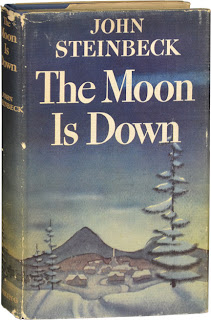All the discussion of “Downton Abbey” and WWI reminded me of some war books I have — ”enjoyed,” is the wrong word. Read with interest. Here are a few of them:
All Quiet on the Western Front by Erich Maria Remarque
I was in my teens when I read this. WWII had been over for several years and none of my family had taken part in it, because of age or disabilities. My only knowledge of war was from the newspapers and newsreels and Lowell Thomas’s radio accounts. This book had a tremendous impact on me. It was weeks before I could get it out of my mind.
Gone With The Wind by Margaret Mitchell
The Civil War was just two words to me. I was a Northerner, a native of Pennsylvania. I had no relatives from the South and the only Southerner I had ever known was my Second Grade teacher, who was from Baltimore. This book was a revelation to me. And the thing that fascinated me most was not the war itself, but its aftermath, and the long-term effect it had on the losers — Scarlett and Ashley.
The Naked and the Dead by Norman Mailer
I remember this one mainly for its shock value. My mother wouldn’t let me read it when it came out. The first book she had ever denied me. (I think I was ten or twelve at the time) so, of course, I found it in the library and was duly shocked — mainly by the f-word. Seeing it in print for the first time was an earth-shaking event!
The Caine Mutiny by Herman Wouk
What a fantastic yarn. Wouk is a master writer who whisks you along like a brisk wind. I knew that from reading Marjorie Morning Star, which I loved. Captain Queeg is an iconic character I will never forget. (And not just because Bogart played him.) And Wouk’s rendition of sailors trapped at sea under the rule of a psychopath is unforgettable.
The Things They Carried by Tim O’Brien
O’Brien had a new way of looking at war — through the personal effects of the soldiers. This original angle brought fresh insight to an old subject. I read this book in a book club. During our discussion, one of the members confessed he had served in the Army in VietNam and his job had been to collect the bodies from the field and bring them back for burial. Among his duties was to empty the dead soldier's pockets and make sure what he found there was sent to the man's parents or his wife. He described how an unknown body was gradually transformed into an individual as he examined his wallet, the pictures inside, his letters from family or sweetheart, his talismans — such as a rabbit’s foot or a religious medal. By the time he had finished, he always felt grief for the loss of this total stranger.
The Moon is Down by John Steinbeck
This book is not well known in America, but it was a bestseller in Europe during and after WWII — especially among people who were active in the resistance. Somehow, Steinbeck, a native New Englander who lived most of his life in California, was able to get inside the minds of people living under Nazi occupation in a small, unnamed town in Scandinavia. He imagined the situation so well that thousands of Scandinavians and Europeans bought the book from underground booksellers, sometimes risking their lives to do so. This is an example of creative imagination at its height.
Now That April’s Here, by ______________?
I loved this book and have not been able to find it. It was written in the ‘40s, I believe, but I don’t know the author. It was about two British war refugees who were sent to stay with an American family during WWII for their safety. It described how they were changed by this experience and their difficulties readapting to life in Britain when they returned. If anyone can locate this book for me, I would be very grateful.
Robin Hathaway



For a nation dedicated to the cause of world peace, we have produced some of the world's most literate works on war. Many would question that, but history is the proof of the pudding. tjs
ReplyDelete